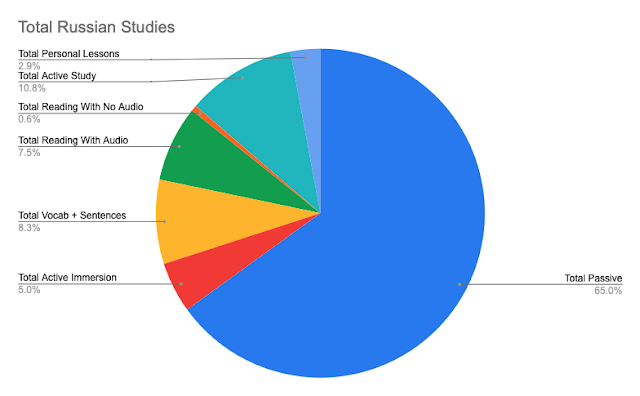My 80/20 approach to acquiring the Russian language
In this video Steve from LingQ talks about applying the 80/20 rule to learning a language. He says that it can be a somewhat misleading goal to aim towards because the true meaning in any text or speech is only really understood with that last 20, 10, 5% or less of the vocabulary. According to Steve the reality is that you don't need kneed to know just a couple of thousands words you need to know tens of thousands of words. We're talking 20, 30, 40k at least.
But what do we mean by 'need'. Need for what purpose?
What I've been thinking about as I've undergone this language learning / acquisition journey is which words do I need and for what purpose Because different people have different goals for learning a language.
Steve often mentions how we wants to be able to read literature in the native language. Obviously that requires a different and much larger vocabulary than someone who wants to be able to order a meal in a restaurant.
Many people advocate reading Harry Potter in your target language to help you learn the language. But consider the types of words that you'll learn along the way; wizard, wand, broomstick, spell. Are those the kinds of words you want to dedicate your precious memory and energy to? That's for you decide. As I've mentioned before my first goal is to be able to have conversations in social settings.
I've decided that I don't need to be able to read classic literature, I don't need to be able to understand understand poetry, I don't need to know language that will enable me to make a business presentation about my economic forecast for the EU. Sure I will learn language that is relevant to those things along the way, and there's definitely something to be said for learning about the cultural context of a language. But for now I'm focussing as best I can on what is relevant to my goal.
I'm not saying that's the case 100% of the time. Sometimes I engage with political content, or comedy content. When I first started i was listening to Dungeons & Dragons streams. But now that I have some fundamental vocabulary in place I need to be mindful of where my effort is directed most of the time.
According to the Speakly app I know 867 words which gives me a score of 67%. The app says:
"The percentage describes the average amount of each daily conversation you'd understand with your learned words. This value will grow quickly in the beginning, as most everyday language doesn't require many words."
What does 67% understanding mean? I don't think it's the case that I could go to Russia and understand fully almost 2/3rds of the of conversations around me. Rather that I'd understand 67% of the words used. In the same way that an English learner could understand 2/3rds of the following sentence: "My first job was as a manager at a nuclear power station". If they don't know what 'job', 'manager' and 'nuclear' then they don't have an understanding of what was said.
Now I think Speakly is a great app that I recommend. It aims to teach the 4000 most "relevant" words. BTW, I don't know if in the case of Russian they count different inflections as separate words or not. As a comparison I'm at 1732 known words in LingQ where the different inflections are counted as separate words.
According to one of their blog posts "we have also analyzed the speaking patters and conversations of more than 3,500 people over the course of five years". From: What makes Speakly so special?
It seems that Speakly defines relevant words as those that are used in daily conversations. I'm going to trust that the next 3000 words will continue to be relevant to my goal but if I feel that's no longer the case then I will stop using the app, at least in the short term.
So while I agree with Steve that it's misleading to expect too much from knowing just 1000 or 2000 words, I do think it's the case that we can be conscious of what we are focusing on and whether it is getting us closer to our goals or if we're waisting time and energy on acquiring less relevant language.

Comments
Post a Comment